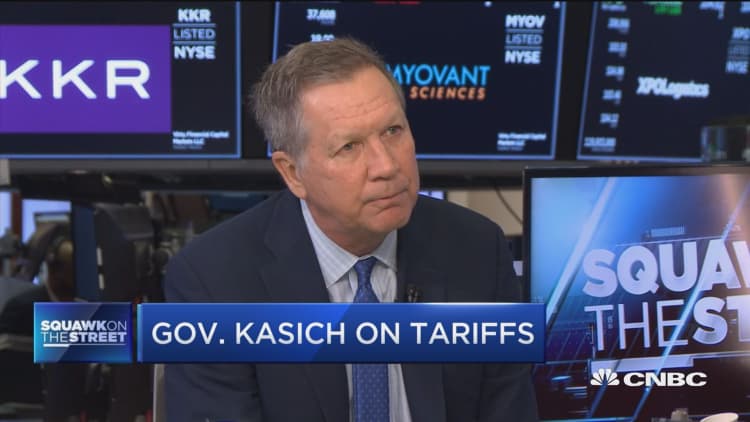
Ohio Gov. John Kasich on Wednesday warned that new steel and aluminum tariffs will raise costs for a multibillion-dollar plant at the heart of Appalachia's ambitions to develop a petrochemicals hub.
Kasich, who ran against President Donald Trump in the 2016 GOP primary and is widely seen as a potential challenger in 2020, said the United States should fight unfair trade practices. But he criticized Trump's process and rationale for imposing the tariffs.
"I just think that protectionism doesn't work," Kasich told CNBC's "Squawk on the Street" on Monday. "It costs the consumers money. It means that we don't have the kind of innovation we want."
Kasich's home state of Ohio, along with Pennsylvania and West Virginia, is trying to develop the nation's second petrochemicals hub. A boom in natural gas drilling in the region has created a cheap and abundant supply of the byproducts used in the industry.
Royal Dutch Shell is building a massive petrochemical facility in Pennsylvania along the Ohio River, and Ohio is closing in on a deal with two Asian companies to build a second world-scale ethane cracker in the region.
"We are very close to being able to land a petrochemical plant in our state," an investment between $5 billion and $10 billion, Kasich said.
The project has long been under consideration by Thailand's PTT Global Chemical. This week, South Korea's Daelim said it would partner with PTT on a feasibility study for the Ohio ethane cracker. The developers now expect the plant to produce 1.5 million metric tons of petrochemicals each year, about a third more than originally envisioned.
But Trump's decision to slap a 25 percent tax on steel imports and 10 percent tariff on aluminum imports has raised concerns that higher construction costs could influence final investment decisions on big industrial projects.
"Will these tariffs increase the cost of building that plant?" Kasich said. "Hello, of course it will."
A string of plants along the Ohio River would supplement the Gulf Coast petrochemicals hub. The plan has gathered steam because northern Appalachia is the epicenter of the U.S. natural gas boom and located near many of the plastics manufacturers who use petrochemicals.
But the high cost of investing in new plants and infrastructure still make the Appalachian hub something of a longshot.


